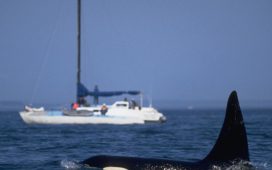Conservationists welcomed “long overdue” catch limits set this week for bigeye tuna and other Atlantic species, but criticised weak measures to rebuild endangered mako shark populations.
The International Commission for the Conservations of Atlantic Tunas (ICCAT) – responsible for the management of tuna and tuna-like species and bycatch including sharks and rays – set new catch limits for bigeye tuna at a meeting in Palma, Mallorca, this week. It also agreed to reduce juvenile fish mortality by limiting certain fishing practices.
But the 53 member nations of ICCAT failed to adopt a recovery plan for shortfin mako, the world’s fastest shark, listed as endangered under the Convention on International Trade in Endangered Species (Cites). Scientists have said a ban on bycatch is needed to rebuild the species.
Alessandro Buzzi, a WWF spokesperson, said: “The progress we are finally seeing on tuna with the adoption of catch limits and control measures are [the] first important steps to allow the recovery of key tuna stocks after decades of unabated overfishing. But the ICCAT nations must become bolder and more ambitious and stop bringing valuable species to the verge of collapse before taking the needed action.”
Earlier this year, governments voted to protect the mako shark under the Cites convention.
Grantly Galland, an officer for the Pew Charitable Trusts’ fisheries team, speaking from Mallorca, said: “With tuna, it does not end overfishing and the catch limit is too high but at least it’s something. On makos, it’s bad news. It means the population will continue to decline and we’re straight back here next year trying to solve the problem. For every year they fail to adopt something, the population continues to decline.”
ICCAT opted to stick with its existing recovery plan for shortfin mako shark, despite scientific advice to go for a policy of no retention in which no mako sharks – including those accidentally killed – can be kept by fishers
“Although ICCAT’s own scientists called for a ban on retention of any North Atlantic mako sharks, managers ignored the advice,” said Galland. “Senegal, Canada and eight other co-sponsors submitted a science-based proposal to conserve the stock, but weaker proposals from the European Union and the United States departed from the scientific advice.” He said, under the measures adopted by the commission, the stock will not recover in the next 50 years.
“This clearly does not constitute effective or precautionary management and calls into question ICCAT’s ability to conserve the sharks under its jurisdiction.”
ICCAT members agreed to cut the current bigeye tuna quota of 65,000 tonnes to 62,500 tonnes in 2020 and 61,500 tonnes in 2021. Scientists have previously advised that the stock recovery period even for a catch quota of 60,000 tonnes is far too long. Experts calculate a quota of 50,000 tonnes would give bigeye tuna a 70% chance of recovery by 2028.
The 53 nations aim to reduce the use of floating rafts known as fish aggregating devices (FADs), known to attract juvenile fish, with a two-month Atlantic-wide ban on FADS in 2020 and a three-month ban in 2021.
ICCAT also agreed to new rebuilding programmes for blue marlin and white marlin and adopted catch limits for blue sharks.
While the commission failed to reach a consensus on catch limits for mako sharks, it agreed to impose certain restrictions. Countries agreed that dead makos that are caught can be retained and landed, provided there is an observer or a functioning electronic monitoring system on board.
Yvon Riva, head of the French frozen tuna association Orthongel, said the changes were “severe – they are going to hurt us, but they are going in the right direction.”
Under the new system, parties with catches above 10,000 tonnes will have to reduce them by 21% in 2020.
Those catching 3,500–10,000 tonnes must cut their catch next year by 17% , while those on 1,000–3,500 tonnes must drop by 10%.













